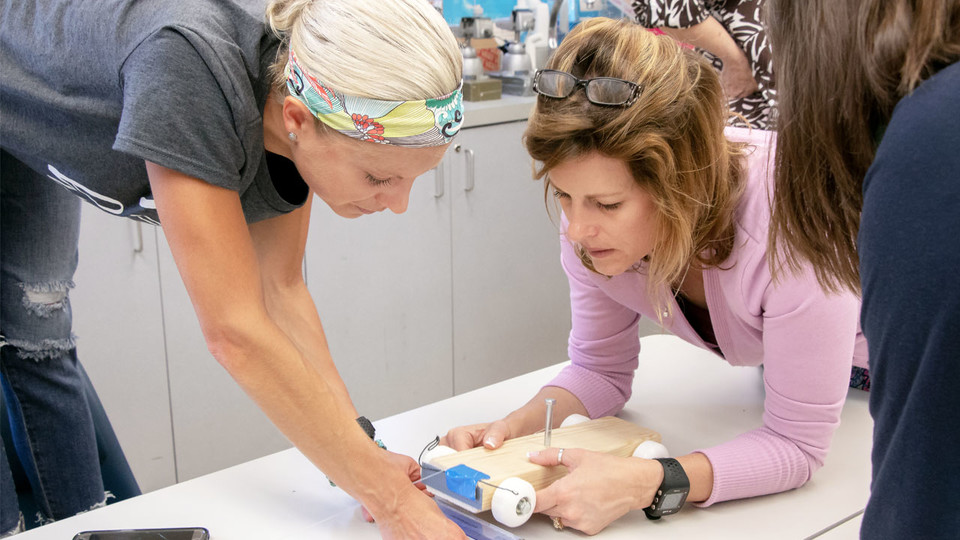Jul 12, 2019
By Chuck Green | CYFS

Recent studies show that 85 percent of the U.S. population has access to 4G, or fourth-generation, broadband network technology.
Which also means that 15 percent of Americans do not.
In Nebraska, the numbers are better. A recent report by Nebraska Broadband indicates broadband is available to 99.5 percent of the state’s residents.
As technology evolves into fifth-generation and beyond, researchers at the University of Nebraska-Lincoln have launched a project to ensure the state’s residents not only have access to such technology, but are able to maximize it.
14 elementary teachers from 14 rural Nebraska high-needs schools — those where the percentage of students receiving free or reduced-price lunches met or exceeded the state’s average within the past three years — are participating in a five-year program focused on developing educational leadership in science, technology, engineering and mathematics, known as STEM.
Funded by the National Science Foundation’s Robert Noyce Scholarship Program and housed at the Nebraska Center for Research on Children, Youth, Families and Schools, the NebraskaSTEM project for supporting elementary rural teacher leadership is designed to help Nebraska teachers facilitate high-quality STEM learning opportunities for K-6 students in rural Nebraska.
“We are positioning these 14 teachers as leaders who will go back to their schools and share effective STEM teaching with several other teachers,” said Amanda Thomas, principal investigator and assistant professor of mathematics education in the Department of Teaching, Learning and Teacher Education.
Guy Trainin, co-principal investigator and Teaching, Learning and Teacher Education department chair, said that because new STEM jobs are emerging throughout Nebraska, it is crucial that rapidly evolving technology reaches everyone in the state.
“Connectivity is all about what you do with it,” he said. “Everyone must have access, and know how to use it, to be able to enjoy the benefits. Otherwise, in some ways, we end up with two societies.”
The teachers were chosen from an applicant pool of 40 certified elementary teachers who currently teach, or intend to teach, in high-needs, rural Nebraska schools. They began their 14-month journey to a master’s degree focused on elementary STEM education with the completion of three on-campus summer courses on pedagogy, physics and math.
“This project increases our ability to reach out to communities across Nebraska to help teachers reach the next level in their career,” Trainin said. “Bringing together teachers from similar rural schools, who are dealing with similar problems — that meeting of the minds is powerful.”
Because of their size and location, Thomas said, rural schools often lack the same resources of their larger urban and suburban counterparts, including access to instructional coaches or professional development. While previous Noyce funding has provided opportunities for STEM teachers throughout Nebraska — including many in Lincoln and Omaha — this project’s focus on rural, elementary STEM initiatives makes it unique.
Along with Thomas and Trainin, the project also includes co-principal investigator Wendy Smith, research associate professor at the Center for Science, Mathematics and Computer Education. Leen-Kiat Soh, professor of computer science and engineering, is also involved, along with other collaborators from TLTE, CYFS, the College of Engineering and the School of Natural Resources.
After learning in March 2018 they had received funding through the grant, the team recruited potential applicants through CSMCE, various networks of teachers and organizations and at conferences.
“We wanted to make sure anyone who might be a candidate could apply, because we had very little lead time,” Thomas said.
As they returned to their schools to begin the new academic year last fall, project teachers continued their own education through online courses and work on their theses. They also will develop a STEM project for their own school, attend conferences together, meet for professional leadership training and receive ongoing guidance from Thomas and Trainin.
“The whole idea is to be able to have that two-way communication that helps us learn, too, about what works and doesn’t work in rural communities,” Trainin said.
As NebraskaSTEM master teaching fellows, the teachers will conduct ongoing mentorship and professional development with their colleagues, sharing their knowledge and skills as they implement high-quality STEM instruction in their classrooms. The fellows will disseminate their work through scholarly publications, conference presentations and professional development related to STEM initiatives in rural Nebraska schools.